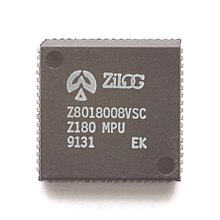Zilog Z180


The Zilog Z180 eight-bit processor is a successor of the Z80 CPU. It is compatible with the large base of software written for the Z80.[1] The Z180 family adds higher performance and integrated peripheral functions like clock generator, 16-bit counters/timers, interrupt controller, wait-state generators, serial ports and a DMA controller.[2] It uses separate read and write strobes, sharing similar timings with the Z80 and Intel processors.[3] The on-chip memory management unit (MMU) has the capability of addressing up to 1 MB of memory. It is possible to configure the Z180 to operate as the Hitachi HD64180.[4]
| Chip | Speed (MHz) | Timers | I/O | Comm. Contr. | Others |
|---|---|---|---|---|---|
| Z80180 | 6, 8, 10 | 2 | N/S | CPU | 1 MB MMU, 2xDMAs, 2xUARTs |
| Z80181 | 10 | 1 | 16 | CPU | 1 MB MMU, 2xDMAs, 2xUARTs |
| Z80182 | 16, 20, 33 | 2 | Clock, Serial, 24 | ESCC, CSIO, UART, PIO | S180 Megacell, 2xESCC channels, 3*8bit IO, 16550 MIMIC |
| Z80185/Z80195 | 20, 33 | 4 | 7/24 | SCC, CSIO, UART | |
| Z8L180 | 20 | 2 | Clock Serial | CSIO, UART | 1 MB MMU, 2xDMAs, 2xUARTs, 3.3 V Operation |
| Z8L182 | 20 | 2 | Clock, Serial, 24 | ESCC, CSIO, UART, PIO | S180 Megacell, 2xESCC channels, 3*8bit IO, 16550 MIMIC, 3.3V operation |
| Z8S180 | 10, 20, 33 | 2 | Clock Serial | UART, DMA | 1 MB MMU, 2xDMAs, 2xUARTs |
| Z8S183 | 10, 20, 33 | 2 | Clock Serial | UART, DMA | 1 MB MMU, 2xDMAs, 2xUARTs 16550, MIMIC, 3.3V operation[5] |
| Z8S189 | 10, 20, 33 | 2 | Clock Serial | UART, DMA | 1 MB MMU, 2xDMAs, 2xUARTs, 3.3V operation[6] |
Z80182
The Zilog Z80182, introduced in 1997, is an enhanced, faster version of the older Z80 and is part of the Z180 microprocessor family. It's nicknamed the Zilog Intelligent Peripheral Controller (ZIP). It's also fully static (the clock can be halted and no data in the registers will be lost)[citation needed] and has a low EMI option that reduces the slew rate of the outputs.[citation needed]
The Z80182 can operate at 33 MHz with an external oscillator for 5-volt operation, or at 20 MHz using the internal oscillator for 3.3-volt operation.[7]
Notes
- ^ Ganssle, Jack (1992). "The Z80 Lives!".
The designers picked an architecture compatible with the Z80, giving Z80 users a completely software compatible upgrade path
- ^ Jack G. Ganssle. (1992). The art of programming embedded systems. San Diego: Academic Press. p. 13. ISBN 978-0-12-274880-6.
- ^ Stuart R. Ball. (2002). Embedded microprocessor systems real world design. Amsterdam: Newnes. p. 34. ISBN 978-0-7506-7534-5.
- ^ "Z80 Application Note: Migrating from the Hitachi HD64180 to ZiLOG's Z80180, page 7 Summary". zilog.com/appnotes_download.php. Zilog Inc. Retrieved May 20, 2019.
- ^ http://www.ic72.com/pdf_file/z/193929.pdf
- ^ Www.Alldatasheet.Com
- ^ "CPU Control Register". Z80182/Z8L182 Zilog Intelligent Peripheral Controller Product Specification. San Jose, California: Zilog. 1997. pp. 3–48.
References
- "Z80180 Microprocessor Unit Product Specification" (pdf). San Jose, California: Zilog. November 2006. Retrieved 2009-07-15.
- "Z80S180/Z80L180 Product Specification" (pdf). San Jose, California: Zilog. 2000. Retrieved 2009-07-15.
- "Z8S180 SL1960 Product Specification" (pdf). San Jose, California: Zilog. 1998. Retrieved 2009-07-15.
- "Z8018x MPU Family User Manual" (pdf). San Jose, California: Zilog. 2003. Retrieved 2009-07-15.
Further reading
- Harston, J.G. (1997-09-09). "Z180 Opcode Map". Retrieved 2009-07-15.
- Harston, J.G. (1998-04-15). "Full HD64180/Z180 Opcode List". Retrieved 2009-07-15.
